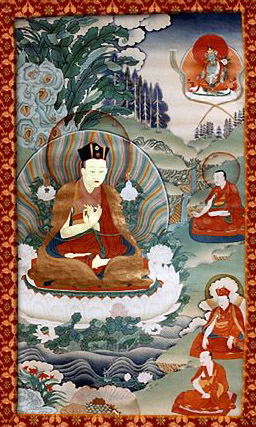Rangjung Dorje: Difference between revisions
No edit summary |
mNo edit summary |
||
| Line 1: | Line 1: | ||
[[Image:Karmapa Rangjung Dorje.jpg|frame|'''Karmapa Rangjung Dorje''']] | [[Image:Karmapa Rangjung Dorje.jpg|frame|'''Karmapa Rangjung Dorje''']] | ||
'''Rangjung Dorje''' ([[Wyl.]] ''rang byung rdo rje'') (1284-1339) — the Third [[Karmapa]]. He was recognized at the age of five as the reincarnation of the previous Karmapa by [[Orgyenpa Rinchen Pal]], and later enthroned at [[Tsurphu Monastery]]. He then studied both the [[Nyingma]] and [[Kagyü]] traditions and took full ordination at the age of eighteen. | '''Rangjung Dorje''' ([[Wyl.]] ''rang byung rdo rje'') (1284-1339) — the Third [[Karmapa]]. He was recognized at the age of five as the reincarnation of the [[Karma Pakshi|previous Karmapa]] by [[Orgyenpa Rinchen Pal]], and later enthroned at [[Tsurphu Monastery]]. He then studied both the [[Nyingma]] and [[Kagyü]] traditions and took full ordination at the age of eighteen. | ||
[[Longchenpa]] and Rangjung Dorje shared a particularly close relationship since they both counted [[Rigdzin Kumaradza]] as one of their [[root teacher]]s and studied together. The Third Karmapa is responsible for introducing [[Dzogchen]] vocabulary into the [[Mahamudra]] tradition (as well as many elements from [[semdé]] and [[trekchö]]), and bringing these two traditions closer together. It is said that during a retreat in his early twenties he had a vision at sunrise of [[Vimalamitra]] and then [[Padmasambhava]], who dissolved into him at a point between his eyebrows. At that moment, he realized and received all the teachings and transmissions of the Dzogchen tantras. He wrote many volumes of teachings on Dzogchen and founded the Karma Nyingtik lineage. | [[Longchenpa]] and Rangjung Dorje shared a particularly close relationship since they both counted [[Rigdzin Kumaradza]] as one of their [[root teacher]]s and studied together. The Third Karmapa is responsible for introducing [[Dzogchen]] vocabulary into the [[Mahamudra]] tradition (as well as many elements from [[semdé]] and [[trekchö]]), and bringing these two traditions closer together. It is said that during a retreat in his early twenties he had a vision at sunrise of [[Vimalamitra]] and then [[Padmasambhava]], who dissolved into him at a point between his eyebrows. At that moment, he realized and received all the teachings and transmissions of the Dzogchen tantras. He wrote many volumes of teachings on Dzogchen and founded the Karma Nyingtik lineage. | ||
Revision as of 12:44, 27 October 2008

Rangjung Dorje (Wyl. rang byung rdo rje) (1284-1339) — the Third Karmapa. He was recognized at the age of five as the reincarnation of the previous Karmapa by Orgyenpa Rinchen Pal, and later enthroned at Tsurphu Monastery. He then studied both the Nyingma and Kagyü traditions and took full ordination at the age of eighteen.
Longchenpa and Rangjung Dorje shared a particularly close relationship since they both counted Rigdzin Kumaradza as one of their root teachers and studied together. The Third Karmapa is responsible for introducing Dzogchen vocabulary into the Mahamudra tradition (as well as many elements from semdé and trekchö), and bringing these two traditions closer together. It is said that during a retreat in his early twenties he had a vision at sunrise of Vimalamitra and then Padmasambhava, who dissolved into him at a point between his eyebrows. At that moment, he realized and received all the teachings and transmissions of the Dzogchen tantras. He wrote many volumes of teachings on Dzogchen and founded the Karma Nyingtik lineage.
Writings
- Treatise on Buddha Nature (Wyl. snying po bstan pa)
- Profound Inner Meaning (Wyl. zab mo nang don)
- Aspiration Prayer of Mahamudra
- Distinguishing Consciousness from Wisdom
- Instructions on Sahajayoga Mahamudra
- 16 volumes of his collected works are available in Tibetan on the Rangjung Yeshe Wiki
Further Reading
- Brunnhölzl, Karl. Luminous Heart: The Third Karmapa on Consciousness, Wisdom, and Buddha Nature. Ithaca: Snow Lion Publications, 2009